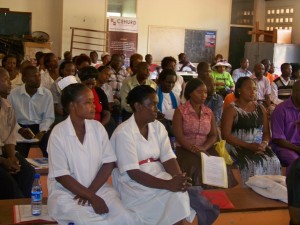
Center for Health, Human Rights and Development CEHURD, Uganda with its partners the Learning Network for Health and Human Rights from South Africa with support from the International Development Research Center (IDRC), hosted a regional meeting that brought together various institutions and individuals who are taking part in the on-going project titled Health System Governance: Community Participation as a key strategy for realizing the Right to Health. The project is an ongoing pilot study implemented in two sites – Cape Town South Africa and Kiboga/Kyankwanzi district in central Uganda.
The project is aimed at developing models for community participation in health that advance health equity and strengthen governance systems for health by testing approaches and sharing experience gained in the two sites using a rights-based approach to health and build the agency of community structures to articulate more strongly claims for health rights, with a view to proposing models for best practice.
Before the meeting, CEHURD together with members from Civil Society organizations in Uganda and delegates from South Africa, Zimbabwe, Zambia, Kenya, Malawi, and Canada visited different sub counties, hospitals, and district headquarters in the communities of Kiboga and Kyankwanzi Districts.
They met L.C 5 chairperson Kiboga, the Medical superintendent Kiboga District hospital, Chief executive office Kyankwanzi District, and Chief health officer Health center IV Ntwetwe in Kyanwanzi district.
This was aimed at meeting community leaders and other senior health officials to hear their experiences, challenges and to understand the decentralized health system in these communities.
It was established that the health system in these two districts is purely decentralized, starting from village level to the District level. This includes Village health teams at village level, Health center II at parish level, Health center III at sub county level and Health center IV at county level and a District hospital at the district level. However, the major challenge faced with the health sector in these communities is poor funding.
In the meeting, participants from countries across the region made presentations about practices of community participation in their countries.
Community voices were also heard from Uganda and South Africa where Uganda was represented by a village health team coordinator who elaborated more on the roles of village health teams which among others included, sensitizing the public about preventable diseases, referring patients to higher health facilities, encouraging mothers to go for antenatal care and handling minor illnesses like dysentery in children under five years.
On the other hand a participant from South Africa also presented her role in promoting community participation in her country which included among others linking community members with health officials, holding government accountable for deliverance of essential health services.
The meeting that aimed at sharing best practices in community participation from different parts of East and Southern Africa in regards health and human rights, identifying strengths and weaknesses and identifying opportunities for networking was concluded successfully as members learnt different lessons regarding community participation.
Among the practices that were learnt in regards community participation as a key strategy for realizing the right to health include, capacity building, strengthening systems, sensitization, creation of awareness, advocacy, resource mobilization, material development, support strategies like litigation services, monitoring and evaluation, and finally dissemination of different publication which are all aimed at promoting and protecting the right to health.
CEHURD will therefore concentrate on the best practices identified to make sure community participation is improved. It will build on the already existing practices and those borrowed from other countries as presented in the meeting.
